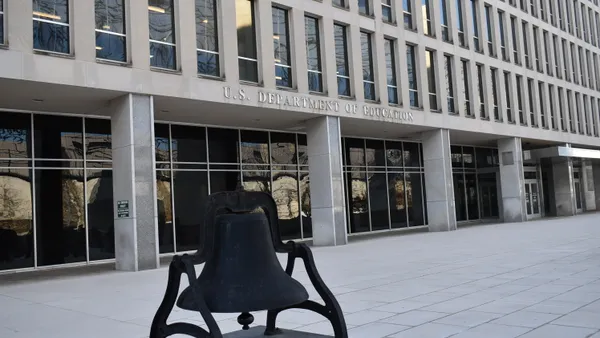Nearly 70 House Republicans are backing legislation that seeks to reverse the Biden administration's Title IX final rule, adding to conservative resistance against the controversial regulation released in April that protects LGBTQ+ students from sex discrimination.
The legislation was introduced Wednesday by Rep. Mary Miller of Illinois, who said in a statement Wednesday that the Title IX rule "is a blatant violation" of the federal civil rights law itself and infringes on women's rights. Miller, vice chair of the House Education and the Workforce Committee, seeks to prevent transgender girls from accessing girls' bathrooms and locker rooms, according to her statement.
Among the legislation's supporters is Rep. Virginia Foxx, chairwoman of the House Education and the Workforce Committee and a staunch opponent of the Title IX rule. Foxx, on Wednesday, called the Biden rule "a clear and present threat, and one that cannot go unaddressed."
Miller's joint resolution would leverage the Congressional Review Act, which allows Congress to overturn certain federal agency actions and gives federal lawmakers 60 congressional days to rescind or approve a final rule. Congress' decision then goes to the president, who can veto a rescission and push the rule through.
Before the Title IX rule came out in April, experts on the federal act had warned that the Education Department's clock was running up against the 60-day Congressional Review Act timeline. Its continued delay, they cautioned, could have risked that a new and potentially hostile administration in the White House would allow the rule to be overturned under the law, making it unlikely the department could issue a similar rule in the future.
The CRA has been used to overturn a total of 20 rules, beginning with the 107th Congress in 2001-2002, according to a February 2023 update by the Congressional Research Service.
However, the department likely sidestepped that hurdle by finalizing the rule prior to the summer, making it probable that any Congressional Review Act decision would land on President Joe Biden's desk.
Still, Republicans are using other avenues in their efforts to block the rule.
Just two weeks after the rule's release, five states filed two separate lawsuits seeking to stop the rule from going into effect in the short and long term, and to keep the 2020 Title IX final rule in place. That count of plaintiffs rose to 15 states in the span of just a few days.
While the lawsuits remain pending, some Republican state education leaders have directed school districts to disregard the rule. They maintain that changing policies in line with the new rule would contradict state laws.
The Education Department, which does not comment on pending litigation, has nonetheless warned that schools must comply with the regulations as a condition of receiving federal funds. Districts have until Aug. 1 to come into compliance.
















